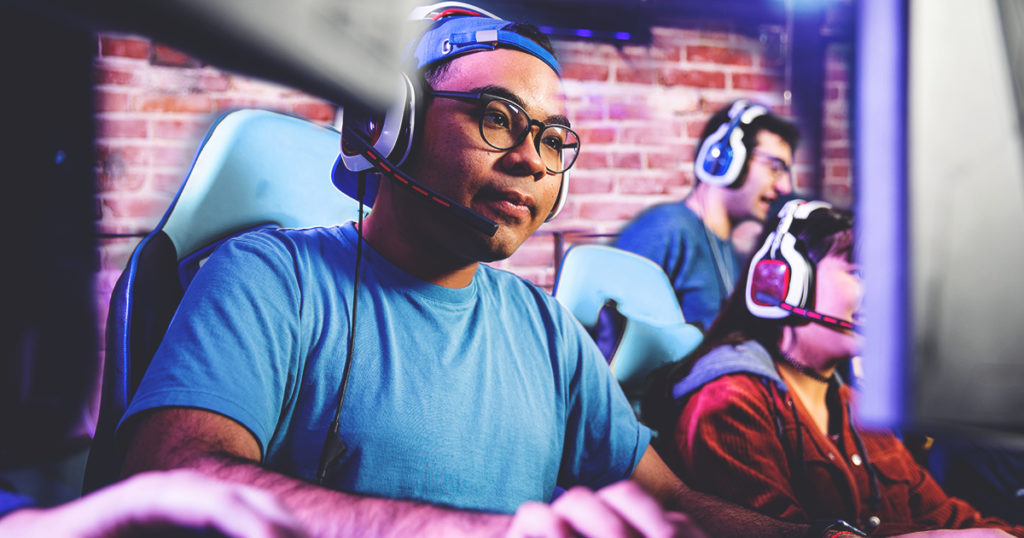Esports is one of the world’s fastest-growing industries. Millions of people worldwide participate in or watch video game tournaments, and innovations in game design and technologies are pushing the industry in new directions.
To learn more about esports in Australia, we talked to Morgan Humphreys, Esports Development Officer at Murdoch University in Perth, Western Australia. Morgan has played a large role in the development of Murdoch’s Esports Gaming Hub, and he predicts an exciting future for the esports and game industry in Australia.
What is esports?
Video games have been around for decades, but esports differs from regular gaming because of its competitive nature. Essentially, esports involves individuals or teams of gamers competing against each other online. Large sums of prize money are often involved. Some of the biggest esports competitions include Dota, Valorant and League of Legends, which Morgan says is currently the world’s biggest esports game.
“[Esports is] human competition where the field is an online arena,” says Morgan. “If you think about sports, it’s very broad, right? You have basketball, you’ve got badminton. Esports is exactly the same, but instead of basketball or badminton, it’s different genres of games.”
In other words, esports gamers are athletes, just like professional netballers, say, or water polo players.
“Any esports athlete has exactly the same focus and discipline,” says Morgan. “If you look at high-profile esports players, they have nutritionists, they have sports psychologists, they have all those support roles which are also in traditional sports… Player wellbeing is a core concept when competing at a high level. They need to be the best player they can be.”
How important is the esports and game industry in Australia?
The esports and gaming industry in Australia is growing quickly. It might be small compared to hubs in other parts of the world, but it’s still worth over $3 billion to the Australian economy. That makes Australia a tempting destination for esports competitors and tournaments.
Institutions like Murdoch University can take advantage of Australia’s proximity to Asia, where esports has exploded in popularity.
“Perth is really well-located in terms of being a gateway to Southeast Asia,” says Morgan. Although Murdoch University’s main campus is in Perth, its Singapore campus “can drive Southeast Asian teams to come here and compete in Perth,” says Morgan.
How can I study esports in Australia?
You might be wondering where to study game design or esports in Australia. At a university level, you can find degrees directly in the field of esports, such as a Diploma in Esports, or programs about game design more generally, such as a Bachelor of Design.
For example, Murdoch University offers a major in Games Art and Design which you can study as part of a Bachelor of Creative Media, or an Honours major in Games Technology, which is available as part of a Bachelor of Science Honours.
It’s also worth thinking about what you could combine your esports study with as part of a degree.
“If a student wants to get into the business side of esports, they should study a business degree and then minor in esports,” says Morgan. “That way, they have those core skills related to business, or whatever avenue they want to go to.”
This will help boost your employability when you start looking for a job.
What jobs can you get in the esports and gaming industry in Australia?
There are all kinds of jobs available in gaming and esports. Think about any other professional sport: other than the athletes themselves, there are coaches, journalists, photographers, commentators, analysts and many other roles.
“All of those [opportunities] are exactly the same in esports,” says Morgan.
You can even bring your esports experience into the classroom and share your passion for gaming with younger generations.
“Currently in schools, we have Minecraft education being used as a teaching tool,” says Morgan. By educating youth about the value of creative thinking and collaboration through video games, you can bring real-world relevance to popular entertainment.
Because of the increasing popularity of video games, most roles in the industry pay quite well. Some of the highest-paying jobs in the esports and game industry include software engineers (average salary of $100,000) and video game artists and designers (average salary of up to $100,000).
How can you improve your chances of getting a job in esports?
There are so many gamers out there. This means it’s important to make yourself stand out against other candidates when getting a job in the industry.
“The number-one thing employers are looking for is hands-on experience,” says Morgan. You could try volunteering or interning with a small esports organisation, for example, to gain core skills and build industry connections.
Also, remember to do your research and keep up with industry trends.
“Do you know the scene?” says Morgan. “Do you know who’s playing and what the different teams are? If not, they’re going to pass on you.”






